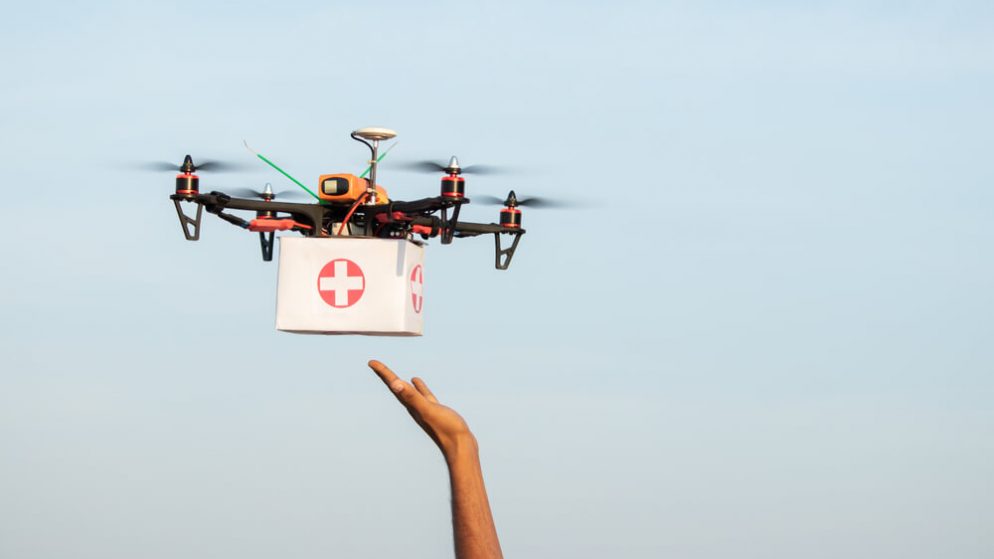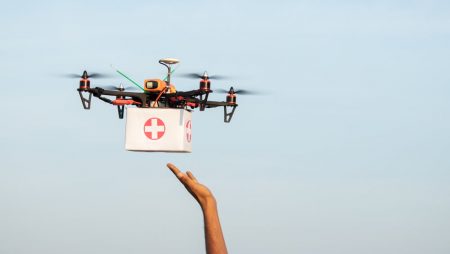



Get new exclusive access to healthcare business reports & breaking news




Drone delivery service in healthcare is beginning to spread its wings both in the States and abroad, with California-based Matternet launching medical drone delivery networks in Winston-Salem, North Carolina, and Berlin, Germany.
According to an iQ Healthtech news release, North Carolina’s Wake Forest Baptist Medical Center’s central campus will host the drone delivery industry’s first hub-and-spoke operating model, which uses one central location to launch drones to various destinations. Drone-maker Matternet is working with UPS’ drone delivery service, UPS Flight Forward (UPSFF), and Winston-Salem-based iQ Healthtech Labs to operate Matternet’s M2 drones to serve the hospital system.
Using unmanned aircraft to deliver patient specimens has a major impact on clinical laboratories. In good weather conditions, drones can ensure shorter delivery times for blood and urine samples from patients.
According to the news release, the drones will cover two routes and carry scheduled deliveries of specialty infusion medicines and personal protective equipment (PPE). Since infusion medicines are patient-specific, they have a short shelf life and high costs, having them delivered by drone within 10 minutes is ideal. Patients will gain more direct access to individually compounded medicines delivered on-demand.
“This partnership with UPSFF aligns strategically with our mission to improve the health of those in the communities that we serve as well as our Virtual Health sector in iQ Healthtech Labs,” said Jane Shen, PharmD (above), Chief Strategy Officer at the Wake Forest Institute for Regenerative Medicine, and Head of Sector Development for Innovation Quarter, a subsidiary of iQ Healthtech Labs, in the IQ Healthtech Labs news release. “We seek to leverage technology advances to make access to healthcare easier and more effective. Collaborating in innovative ways with a key logistics partner like UPS allows Wake Forest Baptist to deliver care in better and more efficient ways to patients and their families.
Matternet is not the only company involved in medical drone deliveries. Our podcast guest, Eric Peck, co-founder, and CEO of Swoop Aero, is giving some details. Swoop Aero is an Australian-based medical supply logistics company that utilizes drones to deliver critical medical supplies to doctors and patients in need across the world. In addition to Australia, they also operate in Malawi and Mozambique to deliver high value, in-demand medical supplies cutting down delivery time and costs associated with moving medical supplies from point A to point B.
Back in the States, In 2019, in a first-ever advance in human medicine and transplantation, an unmanned aircraft has delivered a donor kidney to surgeons for successful transplantation to a patient with kidney failure.
Drone delivery services in healthcare have become so relevant that even the retail giant Amazon, which is always at the forefront of technology and business innovation, has already gotten involved in projects like the drone delivery service Prime Air.
Matternet has been present and operating in the US since August 2018. The Dark Report published the news that the North Carolina healthcare system and the UPSFF completed the first successful paid commercial transport of lab supplies by drone in the US at WakeMed’s flagship hospital and the campus in Raleigh, N.C.
Over 2,200 deliveries of lab samples have been successfully done since. According to Matternet’s statement in a news release, both the service at Wake Forest Baptist Health and WakeMed are part of North Carolina Department of Transportation’s participation in the Federal Aviation Administration’s (FAA’s) Unmanned Aircraft System Integration Pilot Program.
Launched in July 2019, UPSF, the first company to receive the FAA’s Part 135 certification (package delivery by drone), is focused on healthcare deliveries, according to Bala Ganesh, a Vice President of Engineering at UPS. He told Forbes the industry’s “willingness to pay”, as well as “criticality” are important for the success of the endeavor.
Last year, Matternet launched the first beyond-visual-line-of-sight (BVLOS)-operated medical drone network in Europe. Its unmanned aircraft will be flown without the requirement that a pilot always maintains a visual line of sight on the aircraft.
Labor Berlin, Europe’s largest hospital laboratory, which includes facilities in 13 hospitals across Berlin, has been chosen by Matternet as a launch point for its BVLOS operations. Over 15,000 samples are nowadays being transported daily across Labor Berlin’s healthcare system.
“We continue to expand drone delivery operations around the world with a focus on urban environments,” said Andreas Raptopoulos, Matternet Founder and CEO, in a press release. “Hospitals and laboratories in densely populated cities like Berlin need fast and predictable transportation methods that avoid urban congestion. We are thrilled to partner with Labor Berlin and look forward to streamlining their diagnostics work to the benefit of Berlin’s hospitals and residents.”
According to the press release, Matternet’s drone delivery network does not only take samples from hospitals to Labor Berlin facilities up to 70% faster than regular couriers but also helps reduce traffic and related emissions in Berlin’s urban core.
The last few years have really been encouraging for drone delivery, which started to establish itself as a viable alternative to traditional transport methods.
Drone delivery considerably reduces the transit time between medical facilities, as well as related costs, since the shortest distance between two points is a straight line, and that can more easily be achieved by air. Since digital components have already proven to be very valuable to health services, hospital administrators and medical laboratory executives will have to take into account a future drone delivery service able to improve clinical outcomes and raise patient satisfaction.